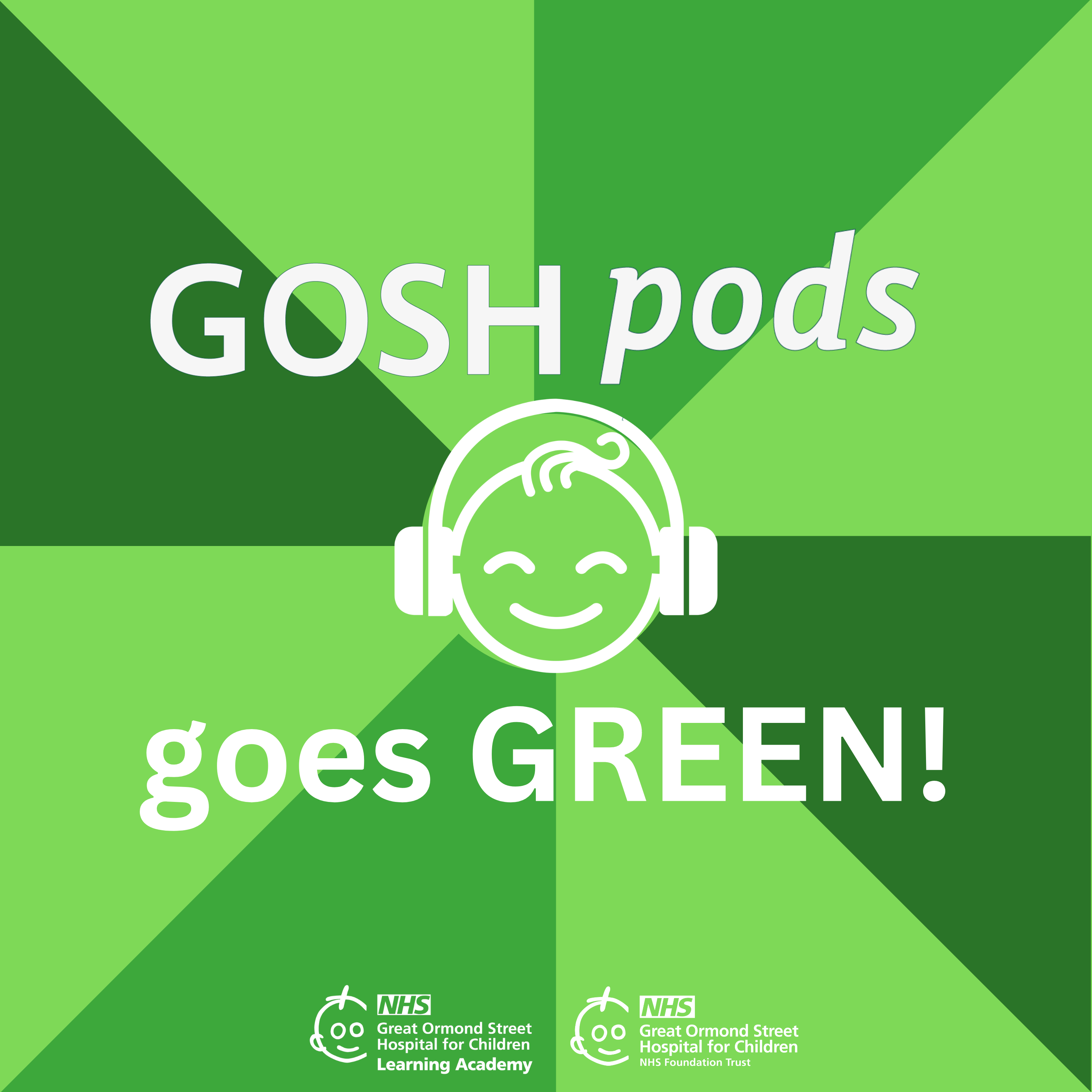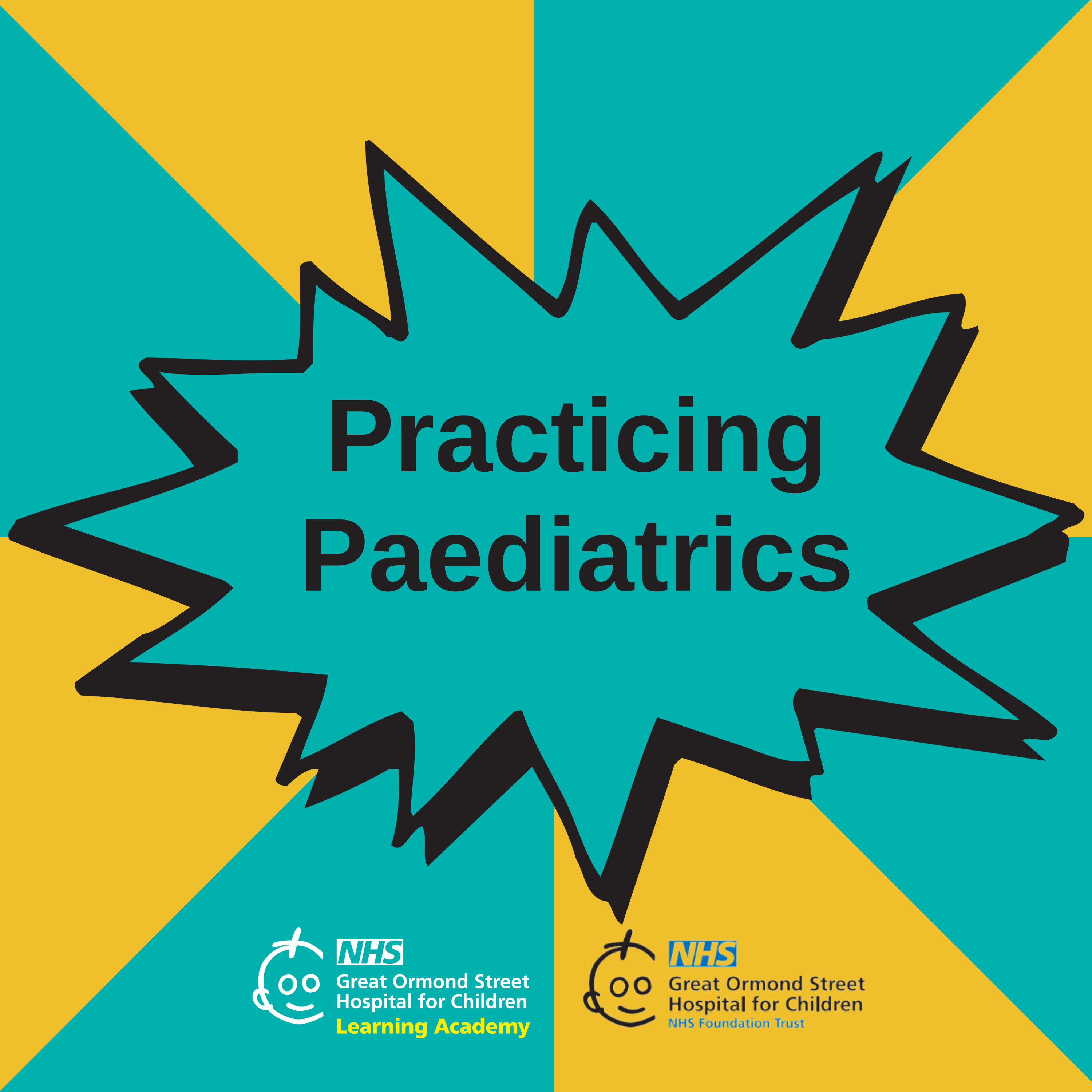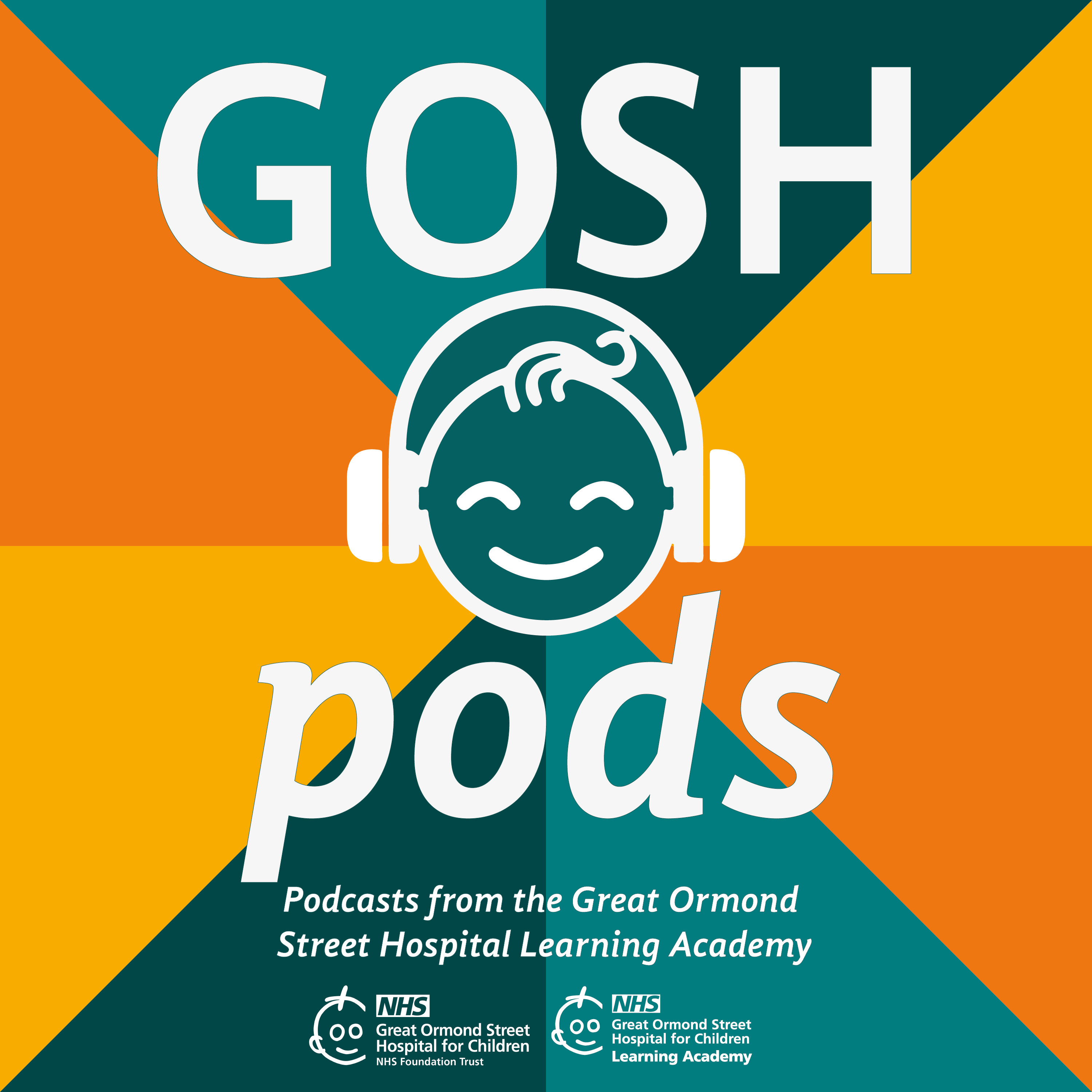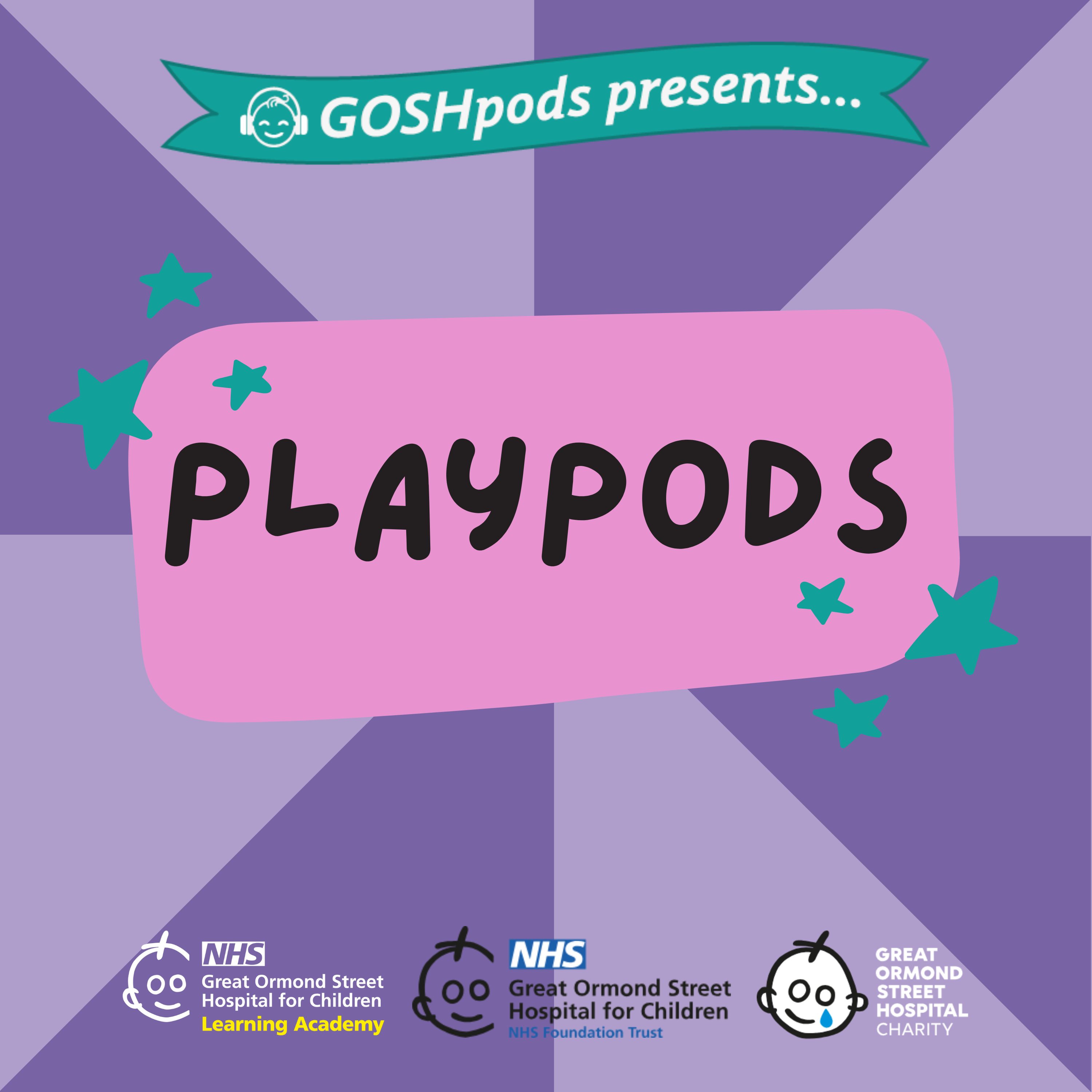This Podcast is brought to you by the GOSH Learning Academy.
[00:00:04] SA: Welcome to the third season of GOSHpods Goes Green. In this season, we're going to be focusing on medicine sustainability. In 2021, Great Ormond Street Hospital was the first UK children's hospital to declare a climate and health emergency. The NHS as an employer is responsible for 4 percent of the UK's total carbon emissions.
And medicines are responsible for 25 percent of that. We're going to explore this topic further, taking a journey through the life cycle of a medicine, covering everything from production and procurement, use of medicines in hospitals and homes, all the way through to medicines disposal, to properly explore how we can change the impact that medicines have on the environment.
[00:00:45] Caroline: Hello, and welcome back to GOSH Pods goes green, with a focus today on medicine, sustainability, and the environment. My name's Caroline. I'm a pharmacist and I've been working with the medicine sustainability team here at GOSH for the last few years.
Today we're going to talk about all things medicines, waste from different attitudes to waste, how to best dispose of medicines you've either bought from a shop or had dispensed to you from a pharmacy or hospital, and why this is so important to make sure we're not worsening or adding to any unnecessary pollution on our planet.
I'm joined by Tracy Lyons from NHS Dorsett. Tracy, would you like to introduce yourself?
[00:01:22] Tracy: Hi Caroline. Thank you so much for having me along. My name's Tracy, as said, and I work for NHS Dorsett down in the south of the country. I'm one of the medicines optimisation pharmacists at the ICB and I'm the medicine sustainability lead, so this is a real passion project of mine.
[00:01:40] Caroline: So, how much of an issue is medicines waste and why should we care about it?
[00:01:47] Tracy: Well, I think first of all, let's address the elephant in the room. It's when you first start talking about waste, it's not a very sexy topic.
But it's actually huge. And if we care about our patients and we've got, an environmentally conscious hat on, it's just one of the most fundamental things we can look at. I think one of the key stats that always sticks in my mind is that in the national Labor prescribing report from a few years ago, there's an estimation that 10% of primary care prescriptions aren't needed, that, they could end up as a waste.
And I had a quick look at prescribing figures before I joined today, and last year 142 million items were dispensed in England, in primary care. So if you think 10% of that. Is, yeah. 14 odd million items. All of those are going to waste. And financially that's a huge number, many zeros.
You think, it's a missed opportunity. We could use that resource to treat patients and really make a difference. And the other thing that really stood out for me in terms of healthcare provision, is if you think of, I know, let's be really conservative and say that each one of those items represents just a minute of healthcare professional time, that creates over 200 million hours of healthcare professional time that's just lost through medication that's not needed.
So it's just huge. And I know in the NHS, we're so driven and focused on new and innovative things, but if we can get this right, we really have the space for it. And then you put your other hats on and you think actually, the carbon footprint of those medications, they've been transported everywhere.
They might end up in our water systems. They can affect the world around us. It's a fundamentally important project, and luckily it's one that we can do lots about. So this is why I'm so passionate about it. I'd love everybody else to get involved.
[00:03:35] Caroline: Wow. Some really staggering statistics there.
You've done an audit relatively recently, how did it start? Who took part? And what was the kind of overall aims and what did you find from it?
[00:03:47] Tracy: So, I have to give a shout out to an amazing network of people who actually undertook this audit. I coordinated it from my desk in Dorset,
but actually the audit was supported by teams at 10 different trusts around the country. 13 different sites. Actually, it wasn't an audit, it was a survey, so I'll get my terminology right. And we were asking patients, if they were given a medicine theoretically on discharge from hospital and they didn't need it, how are they disposed of that medication?
And we asked them, if their habits would change depending on the formulation of the medication and where they got it. We got to this point, following a pilot study that we'd done in Dorset the year before, and the pilot study was actually influenced by a really big piece of work that was run by the OECD, the Organisation for Economic Cooperation and Development a few years back.
And they asked these questions, the patients all around the world, and they found that, again, patient behavior was influenced by where the medication came from and what formulation it was in. But they found predominantly patients weren't disposing of medicines appropriately. And so, there was that lost opportunity to talk to healthcare professionals.
There was the environmental harm, etc. And I read this and I thought, this is just staggering. It's like a fundamental thing that we can do to change and improve medicine. So, we ran a small pilot in Dorset and found similar trends. But actually we thought what we really need is to find out if this is replicated around the country.
All I knew Dorset could have been a little hotspot for a problem, but we wanted to find out what was happening in other parts of the country. So, we were really lucky. We had teams. I'm I'm gonna miss people out there, but like Bath and Hull and Cornwell, Devon, all sorts of places. And it just meant we could get a bigger, selection of information to see what patients were doing.
[00:05:40] Caroline: Fantastic. And of course a bit of a shout out to Fizer, who helped from our site as well. He was our lovely pharmacist.
[00:05:46] Tracy: Oh my goodness.
I'm so sorry.
[00:05:47] Caroline: Not at all.
[00:05:48] Tracy: obvious omission Great Ormond Street as well. I'm so sorry.
[00:05:51] Caroline: So, what did you find, was there much of a difference between the opinions on where the medicines have come from?
What did we find?
[00:05:59] Tracy: We spoke to patients in all of these different centres and we said, you are going to go home soon. Let's imagine a theoretical situation where you're given medication or you have medication at home to manage your health on discharge. And we wanted to know how they would dispose of those medications.
We asked them about tablets and capsules, solid oral forms, liquids, inhalers, injections, patches, drops, like eye drops and eardrops and topical products like creams and ointments. We gave them various different options for what they might want to do with these medications.
And they were given the options of returning to a pharmacy, putting in their household waste or rubbish bin, recycling the medicine, pouring it down a sink or a toilet, or dropping it into the sink or toilet, donating to family or friends or some other process. And, the results were, really interesting findings, but, ultimately we asked them those questions and then we said, actually, would your behaviour change if you had those formulations, and they came from different places. So, we also asked them about medication that came from a hospital, a GP, a community pharmacy, or some other source. And I think probably the examples I gave were a supermarket or a petrol station somewhere that you can buy the medication.
And then we collated the responses and then tabulated them to find out what the trends were. And it was fascinating actually. What we found were that primarily tablets, capsules, liquids, inhalers, and injections, were all being returned to the pharmacy as the primary root of disposal, which is brilliant. Other things that cropped up within that though actually were that about 12% of patients said they would try and recycle their inhalers, which was really interesting because inhaler recycling, is much in demand, medication recycling is demand. But there's a really patchy network of provision around the country. We can't analyse any further, but I hope that meant that certain patients in certain parts of the country had access to a recycling scheme, and could appropriately recycle their inhalers.
The other thing that really was fascinating, was that in line with the Dorset pilot and in line with the bigger OECD study, patients said that actually, if they had a liquid they would pour it down the toilet or the sink nearly a third of the time that they had it. And again, we know we didn't have the chance to pull apart the responses, but I think it all comes down to how patients perceive their medication.
And I think there's a real call for us as healthcare professionals to explain that no matter what formulation and medication is it has to be disposed of properly. Even though all of those formulations predominantly went back to the community pharmacy where you can have proper disposal, we only got just over 50% in most of those and for injections, only 66% of patients would return them to the pharmacy.
So, there's a long way to go. And making sure that everyone knows, the right way to dispose of medication, which is at your community pharmacy regardless of where you get it from. For the other formulations, so we've got patches, drops, and topicals. Most patients would actually put those in the bin.
So. This is regardless of where they got them, regardless of what medication was actually active ingredient in those presentations, the patients would actually try to dispose them at home, put them in their rubbish. Like some of the compounds are so potent. I think, that's a big step for us. We need to educate our patients.
[00:09:29] Caroline: I think particularly because we're here working in a children's hospital, I would say maybe two thirds, if not more, of our prescriptions are in some kind of liquid form, whether that's a suspension or a syrup. So, it must be incredibly valuable to know that, and we should probably be thinking about adding that into a counselling checklist or something really, so that everyone is made aware that it is not okay, no matter what formulation they come in to throw them into the main water supply.
So, talk to us a little bit about that. Why would that shock us so much?
[00:10:00] Tracy: Just in terms of why it's a bad thing to put them in the water supply. Well, we know that, if you put medication into the household waste or down your toilet or down your sink, it goes into our water supply or into like landfill sites.
Though we don't have a system in the UK, that means if you put medication into a landfill site or a medication goes into our water system, that we can appropriately protect our environment from that. And so you get contamination in our environment with the medication. And I think, one of the things that we are all really well educated on is antimicrobial resistance.
So, if there's an antibiotic, you're bringing that into the environment and those resistance genes can spread to us and cause all sort of healthcare problems. The other way to think about it, we do need to think in a broader scope, is that actually we know that other medication agents leach into the water systems or in our local environment, and they affect the other animals and plants that we share the environment with. And there's a growing body of evidence, we need more, but there's a really strong body of evidence now that, when environmental contamination occurs with medication, it changes the way that animals behave.
So, we know it changes the way that they seek shelter or partners or reproduce. I've spoken to patients before, why do I care about bugs or fish or birds or what have you? But we need all of them, I know, just to secure our own environment. So, it is a matter of looking after everybody else so that we can look after ourselves as well.
And we are getting more and more information about what the agents do, but there are really huge international studies now that show that all of our waterways are contaminated with pharmaceuticals. So, we need to gather more information about what they do to our environment.
But I think, ultimately it's common sense. Let's just stop them getting there in the first place.
[00:11:53] Caroline: Absolutely. And just to go back to touch on a point you made earlier as well around recycling. So, again, recycling is a bit of a buzzword. Is there any value in recycling schemes for medicines and do they really work?
[00:12:07] Tracy: I think ultimately recycling schemes could be brilliant. And everyone loves the recycling program, and I think it's like a gateway to sustainability, isn't it? And it's something that most patients can grasp the concept of, but at the moment, nationally, we can't even have a uniform process for recycling glass around the country is different in every area or cardboard or plastic. And there isn't the infrastructure in the UK to have a uniform recycling facility that we can educate ourselves and our patients on. So, there are brilliant independent programs within regions, particularly for recycling inhalers, but at the moment, we just can't stay with a blanket statement, this is where to go, this is how you handle this particular device or this particular product.
So yeah, we want it ultimately, it would be fantastic. I think I always come back to the point that, you don't need to recycle a medication that hasn't been an issue. So if you can avoid the waste in the first place, you don't need to recycle it. So, I'd go back to first principles trying to avoid the waste in the first place.
[00:13:10] Caroline: Fantastic. Yeah, such a really excellent point. Trying to reduce before looking at recycling. So, just to really go back and hammer the point home then, what should we be doing with our medicines waste at home, particularly for those of us with long-term conditions, for example, who need to make sure medicines are taken every day?
How do we make sure that we are taking them well, but also minimising our impact on the climate?
[00:13:34] Tracy: The last thing I want is to come across and say that people shouldn't have their medication. It's so important. We always say that the most environmentally positive medicine is one that keeps you healthy.
So, take what you need to take and don't feel guilty about it. Use it and make yourself happy and healthy in the long term. But I guess the really important thing is, if you don't need a medication, tell one of your healthcare professionals. As individual patients, we're under no obligation to take a medication if it's not working for us, or we need it adjusted.
So, talk to a healthcare professional and if you are one of those healthcare professionals, make sure patients are confident to approach you and discuss their medication so that we can optimise it and make it better. But, one thing I would really say is, as healthcare professionals, I think we need to educate ourselves about what to do with waste medication.
One thing that came up in the study, because we, we took down sort of anecdotes from patients rather than, as a part of the analysis, was that healthcare professionals don't really know what to do with waste medication. I guess this is a great opportunity for me to emphasise the point, but since 2004, it's been part of the standard contract for community pharmacies to accept patient's medication.
Doesn't matter if that medication originated from that pharmacy. Community pharmacies will take medication for you, and I think if there's any problem, if there's any dilemma with that, then you know you can talk to the local community pharmacy network and they can help you find a solution.
But all patient's medication, if it's coming from your home, should go back to a community pharmacy and they can make sure it goes into a high temperature incineration pathway so that it's not going into the waterway, it's not causing these problems. And also, if you take it back to a community pharmacy, that's a brilliant opportunity to say, I didn't get on with this, or I've got 12 at home, maybe my prescription can be amended, that kind of thing. So, it's just a win-win situation and I think as healthcare professionals, particularly in the hospital, maybe we don't think about what happens outside of our four walls. Maybe that's something we could build into our communication with our patients.
[00:15:47] Caroline: Fantastic. Thank you so much for your time today, Tracy, a really fantastic discussion on a real hot topic at the moment when it comes to medicine sustainability.
So thank you.
[00:15:58] Tracy: Oh, my absolute pleasure. Thank you for having me.
[00:16:01] SA: Thank you for listening to this episode of GOSH Pods Goes Green. We would love to get your feedback on the podcast and any ideas you may have for future episodes. You can find a link to the feedback page in the episode description or email us at
[email protected]. If you want to find out more about the work of the GOSH Learning Academy, you can find us on social media on Twitter, Instagram, and LinkedIn.
You can also visit our website at www.gosh.nhs.uk and search Learning Academy. We have lots of exciting new podcasts coming soon, so make sure you're subscribed wherever you get your podcasts. We hope you enjoy this episode and we'll see you next time. Goodbye.



